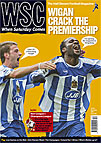 What started as a means of compelling pools companies to contribute to football has become a way to harass webzines. Ian Plenderleith reports on the battle raging over the copyright status of fixtures
What started as a means of compelling pools companies to contribute to football has become a way to harass webzines. Ian Plenderleith reports on the battle raging over the copyright status of fixtures
The issue of copyright for football fixtures (see WSC 181) is in the news again after DataCo – the FA and Football League’s joint commercial venture – closed the Watford webzine Blind, Stupid and Desperate (BSaD) for listing, ahead of time, Watford’s fixture with Leicester City in October.
BSaD received one email from DataCo threatening to shut the site if the fixture was not removed, or if an annual licence fee of £266 plus VAT was not paid. After contacting other sites that had received similar letters, it ignored them. DataCo then approached BSaD’s internet service provider, claiming it had contacted the webzine “several times”, and ordered it to shut it down. The ISP complied.
The site was reopened after BSaD reluctantly agreed to remove the offending fixture, although DataCo stressed they could mention the game in match previews. Only then did the company tell them that each club could nominate a single fanzine to obtain a special fixture licence for just £1.
In the background looms a potentially huge legal battle. In November 2004, the European Court of Justice ruled that DataCo was not justified in charging for their fixtures, because “finding and collecting the data to make up such a list does not require any particular effort on the part of the professional leagues”. DataCo argues that this ruling, in a case its European agent Fixtures Marketing Ltd had brought against betting pools on mainland Europe, does not affect the UK because fixtures have been copyrighted here since a 1959 court victory against pools companies.
Meanwhile, the UK national newspapers, which each pay £4,000 a year for the right to print the entire list, were reported by BBC Radio Five to be preparing a collective legal challenge against DataCo. DataCo maintains that, if successful, the income it passes on to the lower levels of the British game would be lost, pushing football into further financial crisis.
From the fanzine’s viewpoint, unless they are the club’s nominated fanzine (the obvious flaw being that only one fanzine can be nominated per club, whereas most clubs have several), the charges are simply too high for non-profit websites. Fanzines naturally see themselves as providing a service to the game when they notify fans there is a match on the coming weekend.
“If… we are not permitted to observe that we are playing Leicester City at Vicarage Road on Saturday,” BSaD wrote to DataCo’s general manager David Folker, “then it seems to us that your company’s pursuit of its rights has reached a point of breathtaking absurdity.” BSaD also believes that DataCo’s justification for charging for their fixtures is “something that will be looked back upon with raised eyebrows in the future, for… the internet has radically and permanently changed the way that information, about football and everything else, is spread around the world”.
It responded to the company’s position that fans should support the charge for the financial good of the game by saying they sympathised, but “do not regard all revenue-raising activities as acceptable means to an end… We firmly believe in our right to provide fellow football supporters with basic, factual information about their club, much as we must currently bow to your financial clout and legal muscle in enforcing your out-dated licensing system.”
In DataCo’s view, they charge fanzines in order not to discriminate against those media who pay the full charge. They also claim that a ruling against it would cost the game millions.
“DataCo revenues are £7m-£8m per year,” Folker told WSC. “DataCo does not make a profit in the normal business sense – it is a collection agency.” He said revenues are distributed “mainly… to the lower league clubs”. Without it, Folker added, “the Scottish Football League’s 30 clubs will lose 22 per cent of their total income and the Football League’s 72 clubs will lose ten per cent of their distributable income”.
On the ECJ ruling, Folker said that the court “did not consider the actual value of the production of the fixtures when hearing the case”. Although there’s no official cost estimate of producing the fixtures, he said DataCo estimates “the cost of fixtures generation for all four professional leagues as approximately £2.5m per annum”.
Folker also stated that because the media used the fixtures “for their own revenue generation”, it was reasonable to ask them for “a contribution back to the sport they are utilising so freely”.
To conclude, DataCo seems to be on the defensive and a challenge from UK national newspapers against the copyrighted status of the fixture lists could deliver the decisive blow many believe it deserves – not just because it has consistently bullied webzines, but because the whole idea of prosecuting organisations who want to publicise the fixtures is inherently nonsensical.
It’s unclear whether an end to this source of revenue would be quite as catastrophic to football as DataCo maintains, but the Leagues should make contingency plans to allow for a successful legal challenge. After charging money for their fixture lists, however, one shudders to imagine what their alternative revenue-raising ideas might entail. No longer having to pay redundant DataCo lawyers might be a good start.
From WSC 226 December 2005. What was happening this month
Seeing as this is the most popular read today, it strikes me it be useful to have a link to the full correspondence between DataCo and BSaD.
See here: http://www.bsad.org/0506/reports/fixtures_letter.html